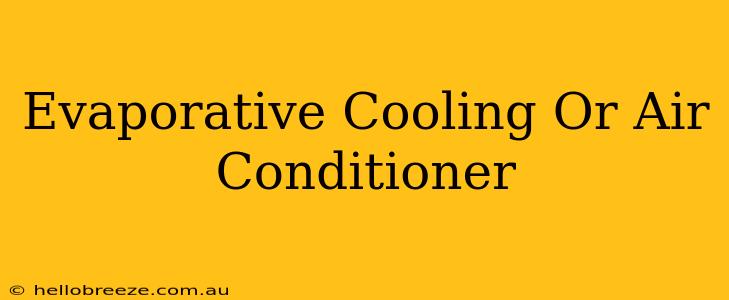Choosing between evaporative cooling and air conditioning can be a tough decision. Both systems aim to cool your home, but they achieve this in vastly different ways, leading to significant differences in cost, efficiency, and suitability for various climates. This comprehensive guide will help you understand the pros and cons of each system, enabling you to make an informed choice for your specific needs.
Understanding Evaporative Cooling
Evaporative cooling, also known as swamp cooling, works on a simple principle: water evaporates, and this process absorbs heat from the surrounding air. A fan blows air over a wet pad or filter, causing the water to evaporate and cool the air before it's circulated into your home.
Advantages of Evaporative Cooling:
- Energy Efficiency: Evaporative coolers consume significantly less energy than air conditioners. This translates to lower electricity bills, making them a budget-friendly option.
- Lower Initial Cost: The upfront cost of purchasing and installing an evaporative cooler is typically much lower than that of an air conditioner.
- Improved Air Quality: The humidification process associated with evaporative cooling can alleviate dry air issues, potentially beneficial for those with respiratory problems. (Note: this benefit is offset in humid climates)
- Environmentally Friendly: Due to their lower energy consumption, evaporative coolers have a smaller carbon footprint compared to air conditioners.
Disadvantages of Evaporative Cooling:
- Humidity: Evaporative coolers add moisture to the air. This makes them unsuitable for humid climates, as the added moisture will not only negate the cooling effect but can also make your home feel sticky and uncomfortable.
- Limited Cooling Power: Evaporative cooling is less effective in cooling than air conditioning, and may not be sufficient in extremely hot climates.
- Requires Water Supply: These systems require a consistent water supply to operate effectively.
- Maintenance: Regular maintenance, including cleaning the pads and filter, is crucial for optimal performance and to prevent the growth of mold and mildew.
Understanding Air Conditioning
Air conditioning works by removing heat and moisture from the air. A refrigerant circulates through a system, absorbing heat from the indoor air and releasing it outside. This results in cooler, drier air inside your home.
Advantages of Air Conditioning:
- Powerful Cooling: Air conditioners offer superior cooling power compared to evaporative coolers, effectively lowering the temperature even in extremely hot and humid conditions.
- Dehumidification: Air conditioners remove moisture from the air, making them ideal for humid climates.
- Consistent Temperature Control: Modern air conditioners allow for precise temperature control, ensuring consistent comfort throughout your home.
- Improved Air Quality (with filters): Many modern air conditioners come equipped with filters that remove allergens and pollutants from the air.
Disadvantages of Air Conditioning:
- High Energy Consumption: Air conditioners are energy-intensive, leading to higher electricity bills.
- High Initial Cost: The purchase and installation of an air conditioning system can be expensive.
- Environmental Impact: The high energy consumption contributes to a larger carbon footprint.
- Can Dry Out Air: While dehumidification is beneficial in humid climates, it can lead to dry air in drier regions, potentially causing discomfort.
Choosing the Right System: A Decision Matrix
| Feature | Evaporative Cooling | Air Conditioning |
|---|---|---|
| Climate | Dry, arid climates | Any climate |
| Energy Use | Low | High |
| Cost (Initial) | Low | High |
| Cooling Power | Moderate | High |
| Humidity | Increases humidity | Decreases humidity |
| Maintenance | Moderate | Moderate |
Conclusion
The best cooling system for your home depends largely on your climate and budget. Evaporative coolers are ideal for dry climates where energy efficiency and low cost are priorities. Air conditioners are the better choice for humid climates or situations requiring powerful, consistent cooling. Carefully weigh the pros and cons of each system based on your specific needs and circumstances before making your decision. Consulting with a qualified HVAC professional can also provide valuable insights tailored to your individual home and climate.

